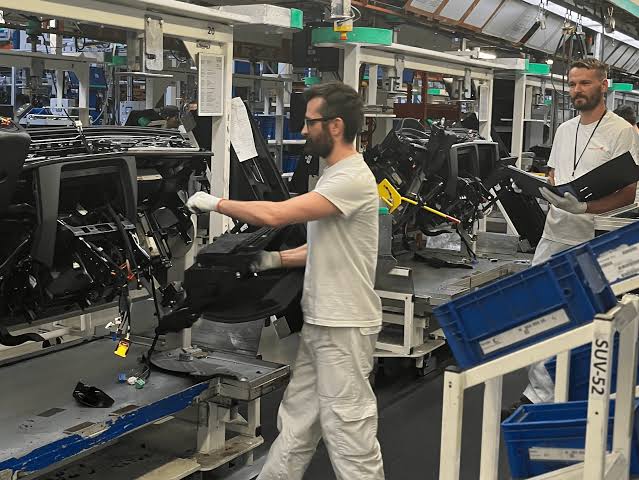So, are you thinking about getting a job in Europe’s automotive industry? That’s a big dream and guess what? It’s not impossible. In fact, Europe has one of the most advanced, innovative, and diverse automotive sectors in the world. They have a lot from German engineering to Italian design and French flair. The continent is packed with companies constantly looking for skilled people to join their teams.
Maybe you’ve studied mechanical engineering like me or maybe you’re just passionate about cars and want to be part of something big. Either way, Europe’s automotive industry could be the right place for you. But, getting a job in Europe especially as a foreigner or non-EU citizen can feel a bit complicated. There are rules, requirements, and a few stones to jump through. But if you play your cards right, follow the right steps, and stay determined, you can land that job.
This guide is here to help you understand how the automotive industry works in Europe and what steps you need to take to get your foot in the door. There are loads of jobs – be a designer, technician, engineer, or even work in sales or marketing for a car brand, we’ve got you covered.
An Overview of Europe’s Automotive Industry
The automotive industry in Europe is one of the oldest and strongest in the world. We’re talking about legendary brands like BMW, Mercedes-Benz, Audi, Volkswagen, Ferrari, Renault, Volvo, and Peugeot. But it’s not just about the big names. There are also tons of suppliers, startups, electric vehicle companies, and design studios that make up the industry.
Germany is the heart of the industry, often called the “engine room” of Europe. But other countries like France, Italy, Sweden, and Spain also play big roles. The industry supports millions of jobs and contributes massively to Europe’s economy. Plus, with the rise of electric vehicles (EVs) and green mobility, there are lots of new opportunities popping up.
The cool thing? The sector is not just for engineers. It needs people with skills in IT, logistics, AI, software development, finance, marketing, and even HR. So no matter your background, there’s probably a space for you.
How to Get a Job in Automotive Industry in Europe
Now, let’s break it down. Here’s how you can make that dream job in Europe a reality:
Step 1: Know What Role You Want
Before anything else, get clear on what job you’re aiming for. Are you into designing cars? Engineering? Quality control? Sales? Or maybe software for electric vehicles?
Each role has different requirements. For example, engineers may need certifications and technical experience. Sales professionals, on the other hand, might focus more on language skills and industry knowledge. So, take your time to figure out where you fit best.
Step 2: Build the Right Skills and Certifications
Europe values strong qualifications. If you’re not from the EU, make sure your degree or certification is recognized. You might need to get your documents evaluated or translated.
For technical roles, learn tools like CAD (Computer-Aided Design), and if you’re into software, brush up on Python, C++, or embedded systems. Also, consider getting additional certifications in automotive technology or project management.
And don’t forget soft skills. Communication, teamwork, and problem-solving are just as important.
Step 3: Gain Some Experience
If you’re still a student or recent graduate, try internships or volunteer projects in the automotive field. Even working in local garages or auto-repair shops helps.
Europe’s companies prefer candidates with real-world experience. If you’ve worked on a car project, done research, or contributed to a product design, even if it was small, just put it in your CV. Every bit counts.
Step 4: Create a European-Style CV and Cover Letter
Yes, this is important. European employers prefer a CV format that’s clear, simple, and professional. Use a two-page max format, list your education and work experience from most recent to oldest, and don’t forget to include languages you speak.
Your cover letter should be customized for each job. Don’t just copy and paste the same thing. Show them why you’re a good fit for their specific company and role.
Step 5: Search for Jobs on the Right Platforms
You can look for jobs by using websites like:
- Indeed Europe
- EuroJobs
- EURES (EU Job Portal)
- StepStone
- Company websites directly (like BMW Careers, Mercedes Jobs, etc.)
My personal advice for you while using platforms like LinkedIn is for you to set job alerts so you get notified when new roles pop up.
Step 6: Apply for a Work Visa (if needed)
If you’re not from the EU or EEA, you’ll likely need a visa to work legally in Europe. This can vary based on the country and job.
Germany, for example, offers a Job Seeker Visa and also a Blue Card for highly skilled workers. Some countries require that you have a job offer first, while others let you come and look for work.
Check the immigration websites of the specific country you want to work in, and start your application early.
Step 7: Prepare for Interviews
Once you land an interview, do your homework. Learn about the company, its products, culture, and recent news. Practice answering common questions like:
- Why do you want to work here?
- What’s your experience with automotive technology?
- How do you handle teamwork or deadlines?
Be confident, clear, and honest. If the interview is online, make sure your internet connection and camera are working well.
Step 8: Learn the Local Language (if possible)
It’s not always required, but learning the local language gives you a huge advantage — especially for jobs in sales, support, or logistics.
In Germany, for example, many technical jobs are in English, but knowing German helps with integration. Same goes for France, Italy, and Spain.
I’ll recommend apps like Duolingo or Babbel can help you get started.
Frequently Asked Questions
Here are some common questions people ask when thinking about working in the automotive industry in the continent:
Which jobs are in demand in Europe automotive industry?
A lot of people have been asking which job is looking for applicants in Europe’s automotive industry. Well, some of the hot jobs right now include:
- Automotive Engineers
- Software Developers for EVs
- CAD Designers
- Quality Control Specialists
- Supply Chain Analysts
- Electric Vehicle Technicians
- Sales and Marketing Managers
What is the largest automotive company in Europe?
Volkswagen Group is currently the largest. It owns brands like Audi, Porsche, Skoda, and SEAT. It’s based in Germany and is one of the biggest car manufacturers in the world.
Which country has the most automotive industry?
Obviously, Germany leads the way in Europe. It has the largest number of car manufacturers and suppliers and exports millions of vehicles every year.
Who is the largest car dealer in Europe?
Emil Frey Group, based in Switzerland, is one of the largest car dealers in Europe, representing dozens of brands and operating in multiple countries.
What is the automotive hub of Europe?
Germany, especially cities like Stuttgart, Munich, and Wolfsburg, is considered the automotive hub of Europe. These cities are home to major companies like Mercedes-Benz, BMW, and Volkswagen.
Which European country has the best automotive industry?
Again, Germany takes the crown here. It combines advanced technology, strong exports, and world-class research. But Italy, France, and Sweden also have excellent industries with companies like Ferrari, Peugeot, and Volvo.
Which city is famous for automobile industry in the world?
Globally, Detroit in the USA is well-known. But in Europe, Stuttgart, Germany is super famous. It’s home to Mercedes-Benz and Porsche, and has a rich history in car manufacturing.
Final Thoughts
Getting a job in the automotive industry in Europe takes some effort. However don’t be scared, it’s definitely possible as I said earlier. Are you a fresh graduate or a skilled professional? Then there’s space for you if you follow the right steps and stay consistent.
Remember, it’s not just about having the right degree or experience. It’s also about how you present yourself, your willingness to learn, and your passion for the industry. The continent’s automotive world is changing fast — electric cars, smart tech, automation are all happening. And it needs fresh minds like yours to keep moving forward.
So go ahead. Start small, dream big, and don’t be afraid to take that first step. You might just find yourself working on the next generation of world-class cars in Europe. Wishing you all the best!






